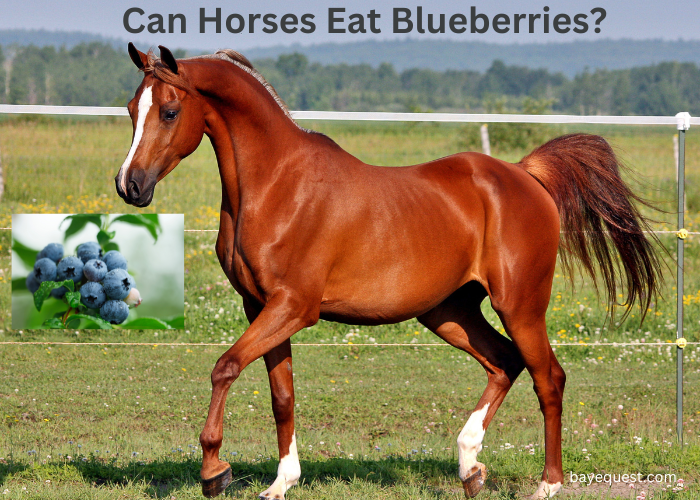Blueberries are small, sweet, and packed with goodness. But can your horse enjoy these tasty treats too? The answer might surprise you.
Many horse owners are curious about which fruits are safe to share with their four-legged friends. Blueberries could be a great choice, but it’s always important to know what’s best for your horse’s health.
Let’s dive into whether these little berries belong in your horse’s snack bucket and how they might benefit—or harm—your equine companion. Get ready for a quick and clear answer.
Can Horses Eat Blueberries? Key Takeaway
Yes, horses can eat blueberries but in moderation. They are a good source of vitamins, such as vitamins C and K. They are also rich in antioxidants, which help support the horse’s immune system. However, due to their sugar content, you must feed them to your horse in limited quantities.
Can Horses Take Blueberry Juice?
Yes, horses can have blueberry juice, but it should be in moderation. When feeding blueberry juice to horses, ensure it is pure and free from added sugars or artificial ingredients.
The natural sugars in blueberry juice are more concentrated than in whole blueberries. So, the quantity offered should be limited to avoid issues related to high sugar intake, such as obesity or metabolic disturbances.
As with any dietary addition, gradually introduce blueberry juice into your horse’s diet and monitor for adverse reactions.
Can Horses Eat Frozen Blueberries?
Yes, horses can eat frozen blueberries. Like fresh ones, frozen blueberries are a tasty treat packed with good nutrients for your horse.
However, ensure you thaw them first to prevent any choking hazards. Also, remember that moderation is key, as the sugar in blueberries can add up.
Introduce them slowly into your horse’s diet and watch for any signs of digestive upset. Remember, variety and balance are essential for maintaining a healthy diet for your horse.
Can Horses Have Dried Blueberries?
Yes, horses can eat dried blueberries. These are a handy and enjoyable treat for your horse, but there are a few things to remember.
Dried blueberries are higher in sugar and lower in water content compared to their fresh counterparts. It’s also smart to check that the dried blueberries don’t have any added sugars or preservatives, which aren’t good for horses.
Like any new treat, start with a small quantity to see how your horse reacts, and always aim for a balanced diet.
How Many Blueberries Can Horses Take?
When it comes to how many blueberries to feed your horse, less is more. Start with a small handful, about 10 to 15 blueberries, especially if it’s a new treat for them.
This small amount lets you see how they handle it without going overboard. Since blueberries are sweet and have sugar, keeping them as an occasional treat rather than a regular part of their diet is best.
Always monitor their overall health and ensure they get a balanced diet daily.
See also: Can Horses Have Candy Cubes?
Benefits of Blueberries for Horses
Blueberries are a super treat for horses, offering several health benefits. Here are some of the benefits:
Antioxidants. Blueberries have loads of antioxidants. These help fight off free radicals, which can damage cells. This means a stronger immune system and better overall health for your horse.
Vitamins and minerals. They’re packed with Vitamin C and Vitamin K, plus they’ve got some manganese in there too. These boost your horse’s immune system, help with bone strength, and support blood clotting functions.
Low in calories. Compared to other treats, blueberries are low in calories. This makes them a good choice for maintaining a healthy weight.
Fiber content. They’ve got fiber, which is great for digestion. It helps keep everything moving smoothly in your horse’s gut.
Natural and tasty. Blueberries are a natural, tasty treat. Most horses find them delicious, and they can be a nice way to mix up their snack time without adding artificial flavors or preservatives.
Nutritional Content of Blueberries
Here’s a table displaying the nutritional content of blueberries per 100 grams:
| Nutrient | Amount in 100g |
| Calories | 57 kcal |
| Water | 84.21 g |
| Protein | 0.74 g |
| Total Fat | 0.33 g |
| Carbohydrates | 14.49 g |
| Sugars | 9.96 g |
| Fiber | 2.4 g |
| Calcium | 6 mg |
| Iron | 0.28 mg |
| Magnesium | 6 mg |
| Phosphorus | 12 mg |
| Potassium | 77 mg |
| Sodium | 1 mg |
| Zinc | 0.16 mg |
| Vitamin C | 9.7 mg |
| Thiamin (Vitamin B1) | 0.037 mg |
| Riboflavin (Vitamin B2) | 0.041 mg |
| Niacin (Vitamin B3) | 0.418 mg |
| Vitamin B6 | 0.052 mg |
| Folate (Vitamin B9) | 6 µg |
| Vitamin A | 3 µg |
| Vitamin E | 0.57 mg |
| Vitamin K | 19.3 µg |
How to Introduce Blueberries to Your Horses
Introducing blueberries to your horse’s diet is easy and should be done gradually to ensure they handle it well. Here’s a simple way to do it:
Start small. Begin with just a few blueberries. You might try giving them 10 to 15 berries to see how they like them and ensure no adverse reaction.
Watch for reactions. After feeding your horse blueberries, watch for any signs of discomfort or allergic reactions. This could include changes in their behavior, digestion, or overall health.
Increase slowly. If your horse enjoys the blueberries and shows no negative signs, you can slowly increase the amount over time. However, remember that blueberries should still be a treat, not a major part of their diet.
Mix with regular feed. To make it even more exciting and to ensure good mixing, you can add blueberries to their regular feed. This distributes the taste and makes it a fun surprise in their meal.
Consistency and moderation. Once you’ve established that your horse is fine with blueberries, you can offer them regularly but in moderation.
How to Prepare Blueberries for Horses
Preparing blueberries for horses is straightforward and doesn’t require much fuss. Here’s how you can do it:
Wash them. First, wash the blueberries thoroughly to remove any pesticides or dirt. Then, rinse them under cold water.
Check for quality. As you wash, check for any squished or moldy berries. You want to feed only the fresh, good-quality ones to your horse.
No need to cut. Since blueberries are small and soft, chopping them up is unnecessary. They’re the perfect size for a horse to enjoy as is.
Serve them fresh or frozen. You can serve fresh blueberries, or if you have frozen ones, ensure they are thawed to room temperature to prevent choking hazards.
Mix with other foods. Mix blueberries with other horse-safe fruits or their regular feed to make mealtime more exciting for your horse.
Creative Ways to Feed Blueberries to Horses
Adding blueberries to your horse’s treat repertoire can be fun and nutritious. Here are some creative ways to incorporate blueberries into horse treats:
Blueberry mash-up. Mix crushed blueberries into your horse’s usual bran mash. The juicy berries add flavor and color, making the mash more appealing.
Frozen blueberry treats. Blend blueberries with water and pour the mixture into ice cube trays or molds. Freeze them and give these chilly treats to your horse on a hot day. They’re refreshing and help with hydration.
Blueberry carrot bites. Grate some carrots and mix them with whole or crushed blueberries. Form the mixture into small balls or patties and bake them on low heat until they’re dry and slightly crunchy. These make great bite-sized treats.
Blueberry oat cookies. Mix oats, crushed blueberries, a bit of honey, and a small amount of flour (just enough to bind the ingredients). Shape the mixture into cookies and bake at a low temperature until dry. Ensure that all ingredients are safe and suitable for your horse.
Blueberry hay cubes. Soften some hay cubes with water, then mix in mashed blueberries. Press the mixture back into cube forms or small balls and let them dry. This treat combines hay’s fibrous benefits with blueberries’ nutritional goodness.
Apple and blueberry mix. Chop up some apples and mix them with blueberries for a fresh and fruity treat. You can serve this mix as is or add it to their feed for an extra special meal.
Potential Risks of Feeding Blueberries to Horses
There are potential risks to be aware of when feeding your horse blueberries. Here are some of the main concerns:
High sugar content. Blueberries contain natural sugars, which can be a problem for horses that are overweight, insulin-resistant, or prone to laminitis. Feeding blueberries in moderation is key to preventing these health issues.
Choking hazard. Although small, whole blueberries can pose a choking risk, especially for horses that tend to gulp their food. To minimize this risk, ensure your horse chews the berries properly or mash them before feeding.
Pesticide exposure. If the blueberries are not organically grown, they may contain pesticide residues. Wash them thoroughly before feeding them to your horse to reduce exposure to these harmful chemicals.
Allergic reactions. While it’s rare, horses can have allergic reactions to any food, including blueberries. Introduce them slowly and watch for any signs of allergy, such as hives, swelling, or digestive upset.
Gastrointestinal upset. Introducing any new food item can disrupt a horse’s digestive system. Start with a small amount of blueberries and monitor your horse for signs of gastrointestinal discomfort.
Other Safe Fruits for Horses
Horses can enjoy a variety of fruits as treats, adding some diversity and enjoyment to their diet. Here are some other safe fruits that horses generally love and can eat without any major issues:
- Apples
- Carrots
- Pears
- Bananas
- Watermelon
- Strawberries
- Grapes
- Mango
- Oranges (Read more on oranges for horses in our other guide.)
- Pineapple
Horses that Shouldn’t Take Blueberries
While blueberries are safe and beneficial for most horses, there are specific conditions where you might want to avoid feeding them this fruit:
1. Horses with metabolic issues
Horses with metabolic conditions like Equine Metabolic Syndrome (EMS) or insulin resistance should restrict their intake of sugary fruits, including blueberries. The natural sugars in blueberries can exacerbate these conditions.
2. Horses prone to laminitis
Horses susceptible to laminitis need to maintain a diet low in simple sugars and non-structural carbohydrates. Due to their fructose content, feeding them blueberries could trigger a laminitis flare-up.
3. Overweight horses
For horses that are overweight or obese, managing calorie intake is crucial. While blueberries are not very high in calories, their sugar content can contribute to weight gain if fed in large quantities.
4. Horses with allergies
Although rare, if a horse has been allergic to blueberries (or any other food), they should not be given blueberries. Signs of an allergic reaction can include hives, swelling, or gastrointestinal upset.
5. Horses with dental issues
Horses with poor dental health might find even small fruits like blueberries difficult to chew, potentially leading to choking hazards.
FAQs
Can horses eat strawberries?
Yes, horses can eat strawberries. They are safe and generally enjoyed by horses, but due to their sugar content, they should be fed in moderation. Clean them well to remove dirt or pesticides, and cut them into smaller pieces to prevent choking.
Read also: Can a horse eat a strawberry?
Can horses eat lettuce?
Yes, horses can eat lettuce. It is a low-calorie vegetable that can add hydration and variety to their diet. However, it should be introduced slowly as it can cause diarrhea in some horses if they are not used to eating it.
Related read: Can horses eat lettuce?
Can blueberries cause colic in horses?
Blueberries are not commonly associated with causing colic in horses. They are safe when given in moderation. However, new food, including blueberries, should be introduced gradually to monitor how the horse’s digestive system handles the new addition. Sudden changes in diet can lead to digestive disturbances, including colic.
Can horses eat celery?
Yes, horses can eat celery. It’s a low-calorie snack that provides hydration and some essential nutrients, such as vitamins A and C. Celery can be a crunchy, refreshing treat for horses, and it’s safe for them to consume, including the leaves.
Interesting read: Can a horse eat celery?
Conclusion
So, can horses eat blueberries? Absolutely. Blueberries are packed with vitamins and a hint of sweetness, making a fantastic treat for your equine friend.
Remember to keep it to a sprinkle. A few berries here and there are a great way to say ‘good job’ to your horse. Like any treat, moderation is key. Too much of a good thing can lead to trouble.
So, mix it up, throw in some variety, and always monitor how your horse handles new snacks.
Here’s to happy, healthy snacking for your horse! Enjoy the journey with those tasty little blue gems.








